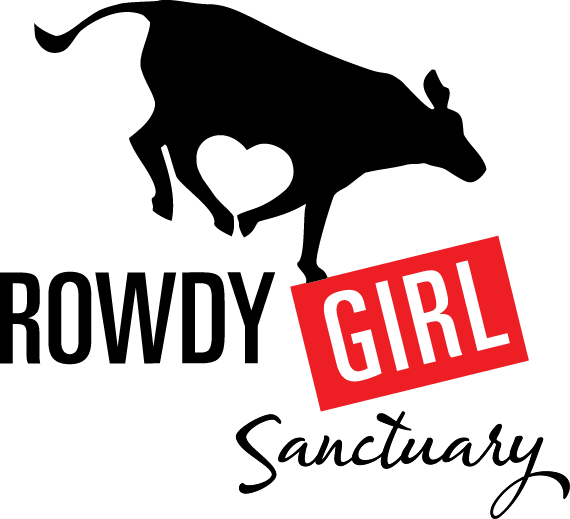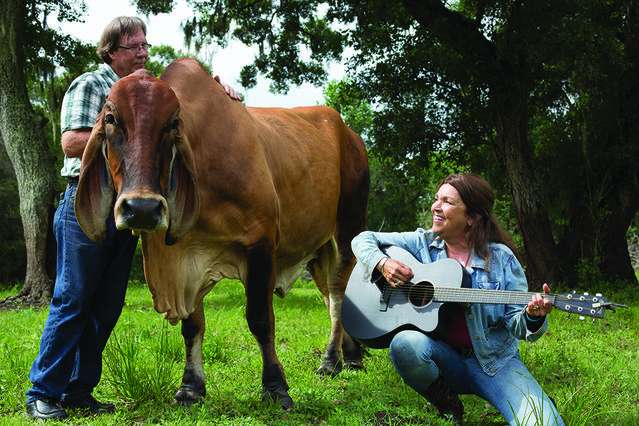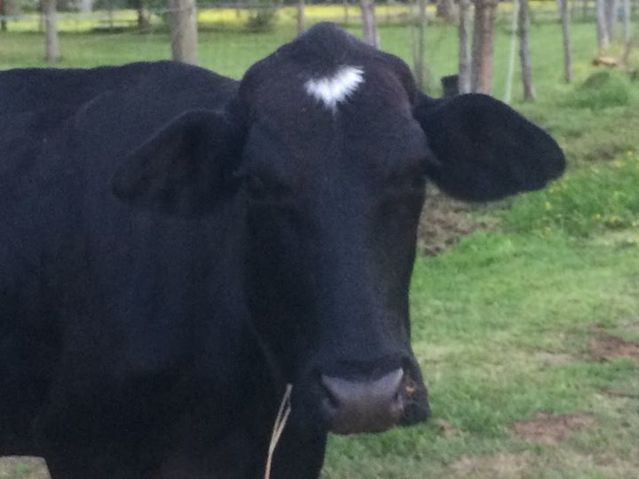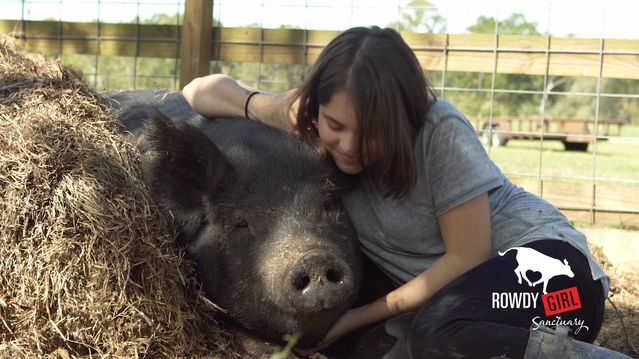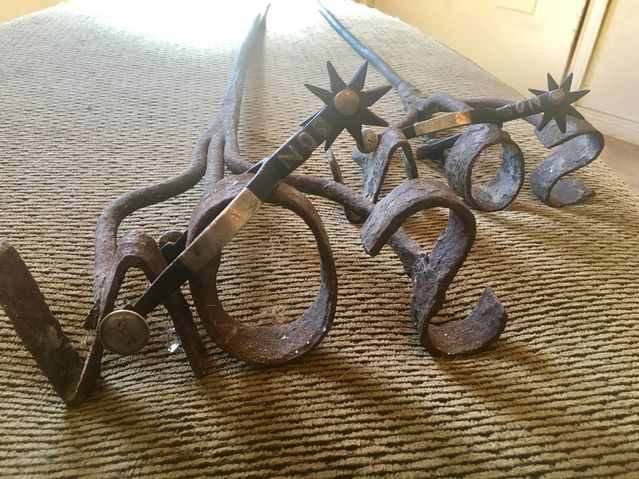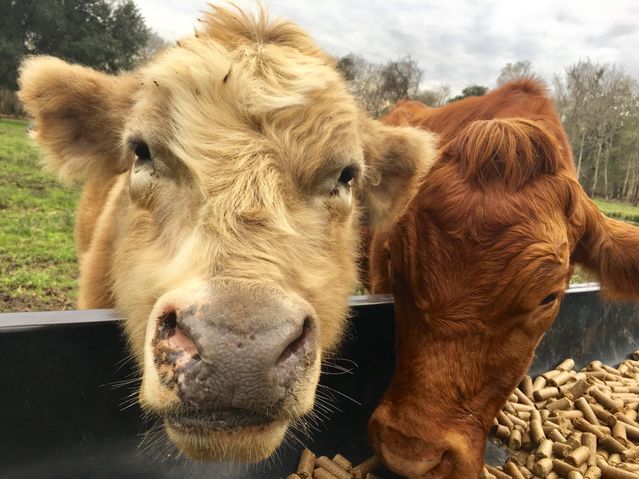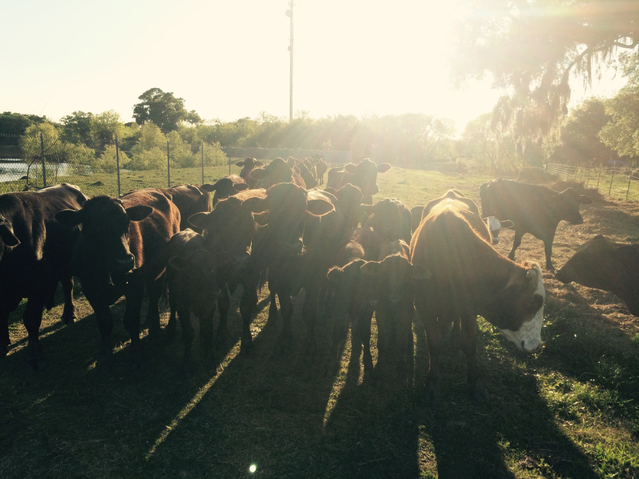Psychology Today Story
Momma Cows, Vegan Ranchers, and the Liberated Range
An interview with Renee King.
Posted Apr 18, 2019
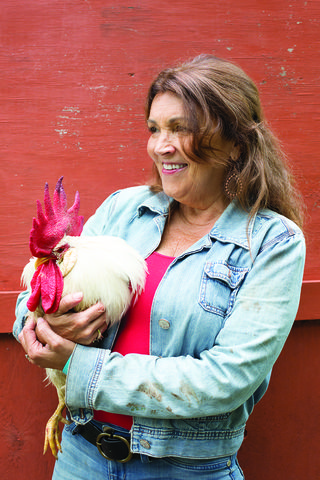 First in the series of interviews on Animal Trauma-informed Care, we hear from Renee King-Sonnen. Here, Renee tells about her psychological evolution from “ex-rodeo lover, leather cowboy, rancher’s wife,” to co-founder of Rowdy Girl Sanctuary, a Texan non-profit, dedicated to farmed animal rescue and plant based/environmental resource education center.
First in the series of interviews on Animal Trauma-informed Care, we hear from Renee King-Sonnen. Here, Renee tells about her psychological evolution from “ex-rodeo lover, leather cowboy, rancher’s wife,” to co-founder of Rowdy Girl Sanctuary, a Texan non-profit, dedicated to farmed animal rescue and plant based/environmental resource education center.
Renee, to situate readers, describe who Rowdy Girl is and what the Sanctuary has become.
Rowdy Girl is a cow—she became my conduit to see the other cows in the herd as beings, instead of food. I bought Rowdy Girl for $300 when my husband, Tommy, convinced me that it would be a rewarding experience for me. Rowdy Girl was a baby and needed to be bottle fed—feeding her, fed me the spiritual undertone of who was really on the farm.
Buying Rowdy Girl was my “buy-in” to the life of a rancher’s wife. I never really wanted to be a rancher, and I certainly never wanted cows; however, when I married Tommy he had acquired the ranch—if I wanted Tommy, I had to take the farm too. As much as I resisted, he eventually wore me down when he told me about these two calves that needed a momma—Bo Bo died young with what is called a “failure to thrive” disease, but Rowdy Girl thrived. I looked forward to the two times a day when I would bottle feed my girl. I began to weave my daily schedule around my time with her, and eventually Rowdy Girl was becoming like a child to me. I never had kids of my own, so when this bouncing baby calf ran for the fence every time she saw me come out of the house to feed her, my heart melted.
It was through Rowdy Girl that I began to see that other cows and their babies mattered too. In fact, my entire world began to be dominated by the cast of cow characters out in the pasture. Soon, I began to distinguish one from the other, and I started naming them—a big no-no if you are selling calves at market. My husband used to tell me “Renee, don’t name them cows”—but, I didn’t listen. I went from not ever noticing the cows to noticing everything about them. What changed? I changed my perception of them. They were no longer just livestock or cattle, they were someone, and I was falling deeper and deeper in love with the bovine.
As a result of that love, my husband and I became at extreme odds with each other. Eventually, I went vegan and after many days and nights of fighting, and extreme stress, my husband agreed to let me buy his cows. I raised $36,000 and bought my husband’s small herd. I started a non-profit, and donated them to Rowdy Girl Sanctuary. Now, almost four years later, we are leading other ranchers in the direction of making the change from animal farming to plant based farming, wind, or solar farms by way of our Rancher Advocacy Program. We also have a passion for helping Future Farmers of America (FFA) and 4H families find their way out of the painful maze that befalls them when they start having feelings for their “project” animal. In these programs, children buy and raise a baby chicken pig, cow or other farmed animal, and then, after being so close and bonding with the animal, sell him or her at a fair for slaughter. Our Families Choosing Compassion (FCC) program is designed to help all members of the family start a new journey, which includes participation in all aspects of the farm animals’ lives. They are encouraged to stay involved with their animal friends all the way through their lives. Rowdy Girl became my muse, and it is because of her that tradition, culture, and mores of a Texas Ranch have been forever changed.
You describe the shift to plant based eating and paying attention to who animals really are has involved a huge perceptual shift. Can you describe your accompanying psychological shift?
Perception is everything! It was during the course of my vegan transition (that I didn’t know was happening, by the way), that I began to perceive ever so faintly that cows loved their babies, and that the babies loved their mommas. Until then, my perception of how a cow and her baby related was NOTHING. The only perception I had was that cows were a source of food, namely protein, and I loved hamburgers and a medium rare filet mignon. And, interestingly enough, I had no clue that any other perception was really possible.
The shift for me happened in spurts of what I call “short circuits.” When I was bottle feeding Rowdy Girl, I would be seduced into a rabbit hole where I could go deep into the psyches, feelings, and emotions of the bovine. The feelings of euphoria, love, joy, and confusion were so heightened when I was feeding my darling Rowdy. Connecting the dots of what babies belonged to which Momma cow was not hard at all when I was on the other side of my consciousness—where I was protected by the love I had for my Rowdy Girl. I could even tune into the babysitter, Tippy—that was a trip.
I’m so grateful to Rowdy Girl for helping me tune into my highest frequency—the frequency where love and compassion for animals is all encompassing—a world where I have realized that I am the only voice they have. What started out as a short circuit, slowly came into full focus. I could never go back to that frequency of violence. If I did, it would drive me insane because the spell of traditional belief systems has been broken.
It is during those kinds of psychological shifts that what many experience as a paradigm shift occurs. That’s what happened to me. It was a polar shift in consciousness and it has changed everything.
Conventionally, sanctuaries serve nonhuman Animals, and Rowdy Girl does so by rescuing and caring for Cows, Chickens, Sheep and other farmed Animals, but in addition, one of your programs is focused on what might be considered human rescue and care, the Rancher Advocacy Program (RAP). Describe how this trans-species program got started and what it is/does.
The Rancher Advocacy Program offers solutions to help farmers and ranchers opt out of animal farming and into vegan farming, solar farming, or wind farming. RAP is pioneering these methodologies, and we provide extensive assessments and services to the families in order to determine if they qualify for the program. There is a growing world trend towards a plant based future, and RAP has a growing coalition of businesses, organizations, and individuals that are passionate about healing our planet, and helping our farmers with viable solutions and strategic partnerships. RAP has a coalition of vegan professionals dedicated to the evolution of farmers moving from animal agriculture to plant based agriculture.
Right now, RAP is in the midst of converting the first ever combined beef cattle ranch/chicken farm into a mushroom farm in Wickes Arkansas. We also have two Texas projects, and one, potentially, in North Carolina. I just joined the board of a new 501(c)(4) non-profit called Agriculture Fairness Alliance, the mission of which is to lobby for subsidies for ranchers and other animal farmers to convert to a plant based model more easily.
Additional to the economic issues involved in changing from cattle ranching and chicken farms, are there psychological and social challenges which rancher and farmers face?
There are a multitude of psychological and social challenges that ranchers and farmers face when they begin the process of changing their way of life. Their entire identity, along with the heritage and history of their ancestors are invested in being animal farmers. They are likely to experience an intense feeling of betrayal as they witness their close family members begin to reject their decision to go against farming animals—especially if they make the connection because of their ethics.
I have had to learn how to navigate the holidays, and even the normal days that involve relationships with my family members. I’m still learning to find my voice in it all. I’m extremely sensitive to the suffering of the animals now, and cannot tolerate being around the blatant disrespect for the lives of others that is disguised as a family feast.
I’m sure that many in the rancher/farmer community looks upon us as odd, and even some of them may see us as an enemy. But, what I have found most prevalent is a growing curiosity because we have broken free of the looking glass, and are on the other side where we are still thriving farmers but loving the animals in our care into perpetuity.
Renee, you have discussed how violence is normalized and made invisible in our society and passed down generation after generation, where child after child is taught to shut off natural feeling of love and care for animals and nature. Can you say a little more of this process and how your children’s program helps derail the chain of accepted violence?
I first heard the terminology of “normalized violence” from Dr. Sailesh Rao, and it rang profoundly with my own intuition. Normalized violence is the underlying foundation which our society has agreed on so that the commodification of farm animals for food would be considered “normal.” However, we have created the most egregious act of violence against our own humanity by accepting violence as a necessary ingredient, not only on our respective plates, but we have accepted the notion that it is “normal” and “right” to pass the same bloody traditions down to our own children. The family system is wrought through and through with rituals around food that cause family structures to be dependent on violence as a way of life. When a family member rejects animal foods and adopts a plant based diet, often times other family members will feel betrayed and rejected. That is how strong the bonds that we have invisibly agreed upon around the suffering and death of innocence are. In fact, we are so proud of our violent inheritance that we will call an elk’s head that was killed by a great grandfather an heirloom. We will save the iron brands and thorny spurs from the past as if our very lives are somehow reflected in the heritage of our forefathers.
Our Families Choosing Compassion (FCC) program is designed to give kids that are in school programs like FFA and 4H, a different way to experience their relationships with farm animals. In FFA/4H kids raise young animals like calves, goats, lambs, etc., so that they can have the best looking animal in show and win scholarships and prestige. This type of education teaches our youth that violence is part of the process of raising animals. They are conditioned to turn against their feelings of empathy and proudly display their trophies after they have sold their best friends to the highest bidder where their beloved friend will then be slaughtered and hacked into little pieces to be sold at the market. Some kids and parents become deeply committed to the well-being of their friend and refuse to accept the normalized outcome of violence that the school system is indebted to. FFA and 4H programs strongly oppose families that choose not to follow through with their program which ends in the slaughter of their friend.
FCC restores family empathy, and prevents them from being scarred for life for having betrayed a loved one. They are able to have a lasting relationship with the farm animal that was doomed to be sold to the highest bidder, and slaughtered. We educate them on how they can become a voice for their friend, and encourage them to explore the vastness of true compassion that lives inside of them. Ultimately, as their relationship deepens with their friend, we see time and time again where these same families garner the courage to challenge the system within. It is these recovered FFA and 4H families that will do the most good at reinventing the school system, so that violence as a subject in school, is abolished once and for all.
The task of making deep psychological and cultural change, daunting. How do you navigate the feeling of being overwhelmed, burnout, and other attendant emotions and psychological stress?
The way that I navigate the feeling of being overwhelmed, and the burnout syndrome of emotional collapse and psychological distress is by taking great care of my body, mind, and soul. I make self-care the primary focus of my daily routine by keeping a regular schedule which includes going to bed early and getting up early, generally between 5:30 and 6:00 am. I get up early to mediate, write, and answer emails. I attend three to four yoga classes a week, and I meditate daily. I also attend 12 step support groups five-seven days a week at noon. Service to others is vital to my sanity. I schedule a relaxation massage twice a month, sometimes more if necessary, and I spend quality time outdoors with the animals. Another important factor of my self-care program is making good plant based food for myself—and not eating a lot of junk. I juice 3-4 days a week, and love preparing wholesome plant based meals which I love to share with others.
I retire for the night between 9:00 and 10:30 pm and I have created the habit of loving my life. I honor the day’s work as my dharma—it’s my life path, my destiny, not a job. I view the tasks of doing my part to create peace on earth for the animals, the environment, and humanity as a privilege that is infused with purpose, passion, humor, and commitment. I strive for spiritual perfection, but am perfectly at ease with my humanness. That, I think, is the vital link in keeping my sanity.
